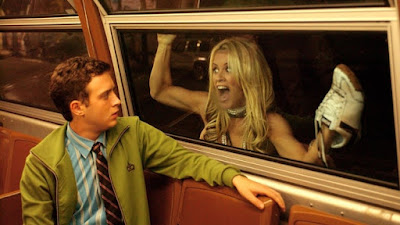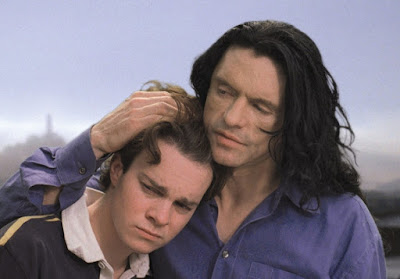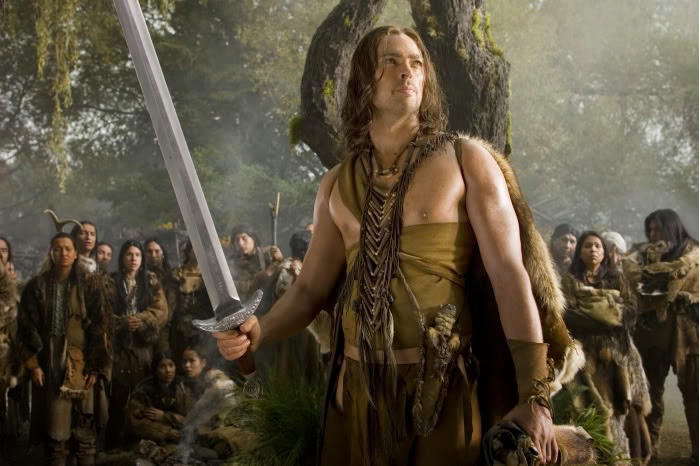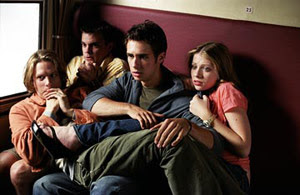During a schmaltzy greeting card monologue in the opening scenes of “Dirty Love,” the heroine informs us that “love is unreal,” before launching into a scene of hysteria after she has discovered the love of her life in bed with another woman. Most people scarred by that sort of discovery, at least in a comedy, would usually plot some sort of devious revenge. Rebecca (Jenny McCarthy) opts to make her grief an incompetent public spectacle, which will include her approaching sex workers for job applications, showing up to public gatherings on the arms of awkward losers, and avoiding run-ins with her ex in various locales, like a grocery store while she is tripping over her own menstrual blood. Are you still listening to this? These are the sight gags of a filmmaker who has watched a plethora of outrageous comedies but has only memorized out-of-context punchlines, relegating everything that he does to a one-note show of languid showmanship. Even then, most narrow concepts could be forgiven if they produce laughs, however shallow. John Asher’s junkyard of a film, unfortunately, only inspires the sorts of groans usually reserved for painful indigestion.
Showing posts with label ZERO STARS. Show all posts
Showing posts with label ZERO STARS. Show all posts
Tuesday, March 17, 2020
Wednesday, September 4, 2019
The Condemned / zero stars (2007)
Ten convicts. One game. Nine must die. The victor walks free. This isn’t an inherently flawed plot description if viewed through the lens of a well-intentioned eye, but the offense that is “The Condemned” exploits it for nothing more than lurid, gut-crushing violence – and in the process becomes one of the most deplorable moviegoing experiences of my life. The very idea of describing these scenes fills me with a dread I rarely recognize – you know, the sort that comes rising from the pit of your stomach when you’re in the throes of danger, or about to witness something causing agony or pain to another? If that’s just a taste of what is possible, then imagine what the poor suckers involved in the movie were thinking. Did they connect with this idea in any substantial way beyond their monetary greed? Was it sold to them as a sincere attempt at understanding our perverse voyeurism? Or were they all part of an elaborate joke being played on the victims known as the audience? I mourned their innocence just as much as they must have wept over the decimation of their careers. Towards the end, a single character stares angrily in the direction of the source of chaos, and he asks scornfully, “are you really trying to save them?” “No,” she retorts, “I was trying to save you.” How strangely comical it must have been for anyone to utter those words in the same room as a director and writer who ought to have seen them as self-reflective.
Wednesday, September 19, 2018
Unbroken: Path to Redemption / zero stars (2018)
“Unbroken: Path to Redemption” is a film that begins and ends with one fatal mistake: forgetting to tell its actors that they are accomplices in a cheap, patronizing melodrama. All the dramatic cues are there, and many of the faces convey an eagerness that is admirable, but every simpering scene of false sincerity moves to the rhythm of some shallow after-school special, where most of the conflict is resolved by broad strokes and nonsensical flash-forwards. For this, yet another aberration in a growing list of exercises by director Harold Cronk – and one that shamelessly follows a far better retelling of this story from only four years prior – the offense is greater: he takes a potentially meaningful discussion point about the traumatic aftermath of war veterans and reduces it to an arrogant demand for Christian unity. That some of it plays as convincing to these on-screen players indicates he has assembled a plausible ensemble to sell his message; that he doesn’t bother to supply them with a shred of intellectual context makes the film not only bad, but irresponsible and corrupt.
Friday, July 6, 2018
Maniac / zero stars (1980)
Quiet and eccentric Frank Zito has serious issues. Rarely occupied by conventional social interactions and often lost in the labyrinth of a self-imposed solitude, he has taken up precarious hobbies as a way of passing the hours – among them, decorating female mannequins throughout his apartment while carrying on one-sided conversations, as if they were verbal punching backs for his paralyzing insecurity. Unfortunately, one key attribute between them bypasses the notion of a foreboding gesture: they all carry the scalps of deceased women he has killed over the recent weeks, with their head of hair acting as a leftover trinket of the crimes. Who these victims are is not as thorough a detail for the audience as much as the anatomy of their demises, and in an early scene on a beach the camera spies one such victim (nameless, no less) having her throat cut so that she can bleed out on the sand. Most films would use this kind of display as a precursor to the psychological study, particularly if it involves an engaging pattern. But the obscene and detestable “Maniac” has only one focus: to fill scene after scene with relentless bloodshed while robbing us of a genuine dramatic context.
Wednesday, November 29, 2017
The Room / zero stars (2003)
Among a cluster of eccentric personalities that found their way behind movie cameras in the recent years, few have developed the notoriety of poor Tommy Wiseau. His is an identity that seems like it might have been invented in a laborious, almost masochistic imagination; soft-spoken in what could be a muddled Polish accent, here is a man of suspicious origins (not to mention independent wealth) who found success in San Francisco as an entrepreneur, possessed fragmented visions of grandeur and went on to fund his first movie entirely out of pocket in a time when independent cinema ebbed high in public demand. That result, “The Room,” has earned infamy as one of the most legendary aberrations of recent times, inspiring eventual cult status and ongoing obsessions in the minds of those who gravitate towards the common fodder of midnight movie revivals. Their reasons are not difficult to decipher; the mess before them was so utterly miscalculated in its inconsistent spontaneity that one could only laugh at the result, however uncomfortably. Even Ed Wood only went so far in his ridiculous indulgences. But is anyone who experiences Wiseau’s passion piece really admiring the disaster before them as some kind of audacious endurance test, or are they laughing at the expense of someone who doesn’t appear to know better?
Thursday, August 10, 2017
Alone in the Dark / zero stars (2005)
I should be issuing warnings to those who may encounter “Alone in the Dark” but instead find my words guided by a greater urge: to maul the film in the same vicious, unfiltered manner that it contaminates the movie screen. Here is an endeavor (if you dare call it one) so utterly bereft of the simplest morsels of intelligence that it inspires a wrath within that I have rarely recognized, leaving me in an elusive predicament – how do you savage something this pathetic, this completely unbothered by the basic concept of passable composition? Those who stood behind the camera weren’t just making a lazy movie, they were allowing themselves to undermine the basic desire of going to the theater. Usually hidden behind all the pomp and circumstance of something superfluous is a motive that at least intends someone to have a good time, and we can cut some bad movies slack when we understand (and accept) those aims. But not a soul involved here is capable of passive intentions, much less a rational thought. Their purpose is to deliberately rob innocent filmgoers of precious time, without anything to show for it beyond regret and empty wallets.
Tuesday, April 4, 2017
House of the Dead / zero stars (2003)
The utterly dreadful “House of the Dead” wages war against the enthusiasm of moviegoers by asking a dangerous key question: can filmmakers be as stupid and irresponsible as the characters they exploit? Five minutes into the picture and I felt my inner child weeping for the future of the industry. That’s not to say this is an endeavor made with dubious intentions; on the contrary, I’m positive everyone involved legitimately thought they were participating in something amusing, at least on a professional level. But that makes their associations all the more damning when one contemplates them in the context of the final result, a film so inept that one can only gaze on it with relentless confusion. What possessed the director, Uwe Boll, to orchestrate his maddening opus with the hands of a clueless lunatic? What nerve did these writers (if you dare call them that) have in pitching a screenplay that most college students would be embarrassed to submit as a first draft assignment? And what of the designers of the game it is based on, who will no doubt look on at these images and find themselves inflamed with outrage that their source will now forever be disparaged by this stain of an incompetent adaptation?
Friday, December 11, 2015
Saving Christmas / zero stars (2014)
He begins his diatribe as most do in the precursors to holiday yarns: seated at the front of a crackling fire, a Christmas tree in the backdrop and stockings hanging from an elaborate mantle façade. His smug, unsavory smile cloaks a disgust for inclusive perspectives, and his words – clearly improvised – rattle on about the contemptuous nature of differing opinions. No, these are not the joyful invites into a world of good cheer and worldly connections; they are the damning indictment against any person in the audience who has ever shared a more broad view of the holiday meaning, especially one that includes considering anything beyond fundamental Christian values. If these warnings had come from anyone less devoted to the cause than Kirk Cameron, we might have just assumed innocence, or even irony. But knowing that they belong to this, a self-proclaimed authority of the teachings of Christ, is to find oneself trapped in the embrace of a self-indulgent ideology. The concept itself would be dimwitted if it weren’t so dangerous.
Wednesday, May 6, 2015
Chaos / zero stars (2005)
David DeFalco’s “Chaos” is an unholy assault on human decency, a worthless and hateful celebration of evil that not only delves into excessive cruelty, but has the insolence to frame it all within the perspective of a pretentious moral obligation. At the opening of the picture, a title card informs us that the ensuing material is purposely extreme for the sake of “education,” although any initial claims of the sort are usually shields in these sorts of pictures. From what, you dare to ask? It usually comes down to the inevitable reality that all subsequent events are glorified to a point of perversion, which often necessitates a disclaimer for damage control. But any sensible person who will be unfortunate enough to witness any two minutes of this shameful and mean-spirited disaster will easily protest such prospects, because what they will be seeing is 74 minutes of senseless torture and sadism lacking all notions of context. By the end, the only certainty is that we are united in our wonder of more underlying concerns: namely, how the people who made this ever thought it could be palpable to audiences with some semblance of ethical integrity.
Saturday, October 25, 2014
Captivity / zero stars (2007)
When it comes to the daunting task of dissecting the divisive nature of film genres, no kind is more volatile than the ever-so-audacious horror movie. What is it about the dark nature of the human psyche that fills filmmakers with such polarizing ideas? What is the tipping point at which any idea can lose sight of purpose and exist purely for the sake of senseless violence and mayhem? And moreover, how can the person standing behind a movie camera effectively balance the most lurid of notions with a context that validates their ideas, no matter how graphic? The more abrasive the material, the more difficult it is for someone at the helm to discover meaning. More often than not, it all simply falls into the hands of those who lack the foresight to stay within credible boundaries, or are just too lazy to try. For every effective endeavor that does in fact emerge from this genre, there are usually ten or twenty more of a similar vein that reject the concept of moral purpose. Roland Joffé’s “Captivity,” a despicable film, is the poster child for that latter sensibility.
Monday, July 14, 2014
Pathfinder / zero stars (2007)
“Pathfinder” is one of the ugliest and most incomprehensible movies I have ever seen, a cynical exercise so unpleasant to endure that it doesn’t even have the gumption to inspire disbelief, much less unintentional laughs. Had the camera been a firing squad pointed towards its actors, their careers would have taken less damage. And what’s far worse a notion is that its filmmakers, obviously caught somewhere between insanity and masochism, actually had the nerve to make and release a movie in this utterly wretched condition. Was no one in the pre-production stages willing to speak up in protest, if for no other purpose than to prevent undoubtedly talented individuals from embarrassing themselves? Or were their protests simply unheeded because of misplaced arrogance? A documentary dealing with that answer would make for far more interesting a movie than the result currently staggering around in front of us.
Monday, July 27, 2009
Orphan - zero stars (2009)
A moment of distress sets in during the early stages of Jaume Collet-Serra’s “Orphan,” in a dream sequence that features a mother-to-be strapped to an operating table as her newborn, said to have died in the womb, is savagely vacuumed out of her uterus and half of its remains are handed to her in a blanket. This sequence, we learn, is an offense of repetitive nature, to be replicated at several sequential periods of the movie when characters indulge in arson, threatening the lives of others, animal abuse, the murder of nuns, sabotaging marriages, throwing school bullies off playground equipment, suffocating kids who have spinal injuries and countless other questionable acts. For 123 minutes, we find ourselves at the mercy of a story that treats all of this to not just crude and shocking proportions, but also to points that showcase obvious lapses in moral judgment and taste. Such qualities seem to be mere technicalities in an age of horror when boundaries no longer are in view, and here is a movie that makes full use of its ability to strategize the harshest, most macabre manifestations seen in any recent film plot.
Friday, May 6, 2005
House of Wax / zero stars (2005)
"House of Wax" is such a vile and despicable heap of trash that I pity any lucid person who will actually pay decent money to sit through it. As a straight horror film, it supplies no legitimate horror other than the notion of sabotaging its source material in favor of visual repugnance, and as a remake of yet another famous 1950s scare-fest it completely squanders any chances it might have had of at least being amusing on the nostalgia scale. The people involved in making this thing should be ashamed of themselves; it is the kind of picture so revolting that it deserves to not only undermine careers but general reputation as well. A good manager might have pointed out that such a credit on a film resume might do a lot more damage than it's worth, but I guess you can't necessarily expect much sense from anyone who showed interest in the project to begin with.
Thursday, March 4, 2004
Eurotrip / zero stars (2004)
Understanding the motivation behind someone making a film like "Eurotrip" is like trying to understand one's motivation for laughing at it: in both cases, there are no reasons, but just empty excuses. The realm of comedy tends to leave more doors open than most other genres with a knack of stretching standards of taste, but if one thing remains certain in any and all types of movies, it's that no kind of positive response can be warranted to products in which audience response is but a side detail in a filmmaker's grand scheme. Jeff Schaffer, the man who directed the film we have before us, seems to be so amused by the fact that he's enforcing negative stereotypes and offending vast segments of population that he doesn't care about any legitimate element of humor. If you chuckle, it probably means that you are simply having a knee-jerk reaction to the deplorably bad taste the picture utilizes; in any other case, laughing would be a sign that you either have lost touch with reality or are just easily amused by films that lack any sense of judgment. You, my friend, are not the kind of person who should be reading this review.
Friday, March 21, 2003
Boat Trip / zero stars (2003)
So here it is already, just three short months into the year—the single worst movie of 2003. "Boat Trip" hurls itself onto the screen like an endless diatribe of amateurism, slashing its way through one bad scene after another before it ultimately sinks into the murky depths of nothingness. The movie is an insulting, pathetic and tone-deaf assault on our senses; to watch it unfold from beginning to end is to feel imprisoned by the screening room it is playing in.
Monday, December 2, 2002
Eight Crazy Nights / zero stars (2002)
It must be more than just sheer coincidence that the worst animated film since "Cool World" is being released alongside one of the most brilliant of the recent past. Adam Sandler's aptly-titled "Eight Crazy Nights" finds itself being unleashed on reputable theater screens during the same weekend as Disney's highly-anticipated "Treasure Planet," the first traditional feature cartoon since "Titan A.E." to rise above the mold and pull the viewers into an experience both adventurous and exhilarating. Lumping these two products together, if you think about it, is an ideal marketing campaign—if the moviegoers are going out of their way to see a cartoon during Thanksgiving, do they really care enough to make a choice between two major openings? Of course not. And given the fact that Sandler's name—not to mention the holiday theme—is attached to this one, that's probably exactly what Columbia Pictures is depending on.
Monday, October 21, 2002
Formula 51 / zero stars (2002)
A series of new words need to be invented just to describe how wretchedly awful "Formula 51" really is, the new vehicle starring one the box office's most relentless legends, Samuel L. Jackson. This isn't just your standard bad movie, but one that abandons every established rule of a repulsive endeavor and creates a chain of new ones simply for itself. The movie is a sad, sorry, contemptible pile of garbage, and how any studio has the balls to back it in a major market, I will never understand.
Friday, February 15, 2002
Slackers / Zero Stars (2002)
The success of comedy ultimately depends on a movie's ability to find a core audience, but if most moviegoers have any kind of stable brain function, they'll make sure they don't become part of the warped, dimwitted circle of viewers who have been targeted for "Slackers," the latest in a never-ending series of teen gross-out comedies executed with the emphasis on perverted sexual antics. Lowering the bar of bad taste to a level achieved previously only by Tom Green with "Freddy Got Fingered," the movie is nasty, reprehensible, shallow and lazy, pulling off its material in a manner that results not in laughs, but in groans of agony. And the movie's not even bright enough to at least see the potential of a sense of humor amidst all its meandering. Its only interest is in grossing us out, simply for the sake of being gross.
Friday, January 25, 2002
Rollerball / zero stars (2002)
As movie theaters slowly but surely toss aside the remnants of the 2001 award contenders, we as a defensive moviegoeing public continue to be subjected to a relentless batch of massive cinematic mistakes, a deed that normally occurs in the first four months of every new year as movie studios attempt to wipe their slate clear of any major errors of the past. Audiences already know the painful experience of witnessing this year's notable travesties—including "Orange County," "Impostor" and the recent "Slackers"—and will undoubtedly keep their defenses up as we sleepwalk our way towards a (hopefully) brighter future at the multiplex.
Saturday, September 29, 2001
Bubble Boy / zero stars (2001)
Comedy has taught us that one man’s laugh is another man’s disgust, and that thought needs no further explanation beyond the background story surrounding “Bubble Boy,” a movie about a 16-year-old teen with immune deficiency who seeks romance, but is unable to live outside of a plastic bubble for fear of coming in contact with germs which, ultimately, could lead to fatality. Even before its release, the movie was challenged by the mother of a now-deceased son that suffered from the same illness, who feared that such an approach to comedy was unsuitable and defamed the memory of her child. An understandable response? Perhaps. However, having not seen the movie, Carol Ann Demaret, the mother of the original “bubble boy,” has jumped to a conclusion simply on the basis of her personal experience, not to mention the fact that her uproar has actually given the movie more publicity than it ever needed.
Subscribe to:
Posts (Atom)




















